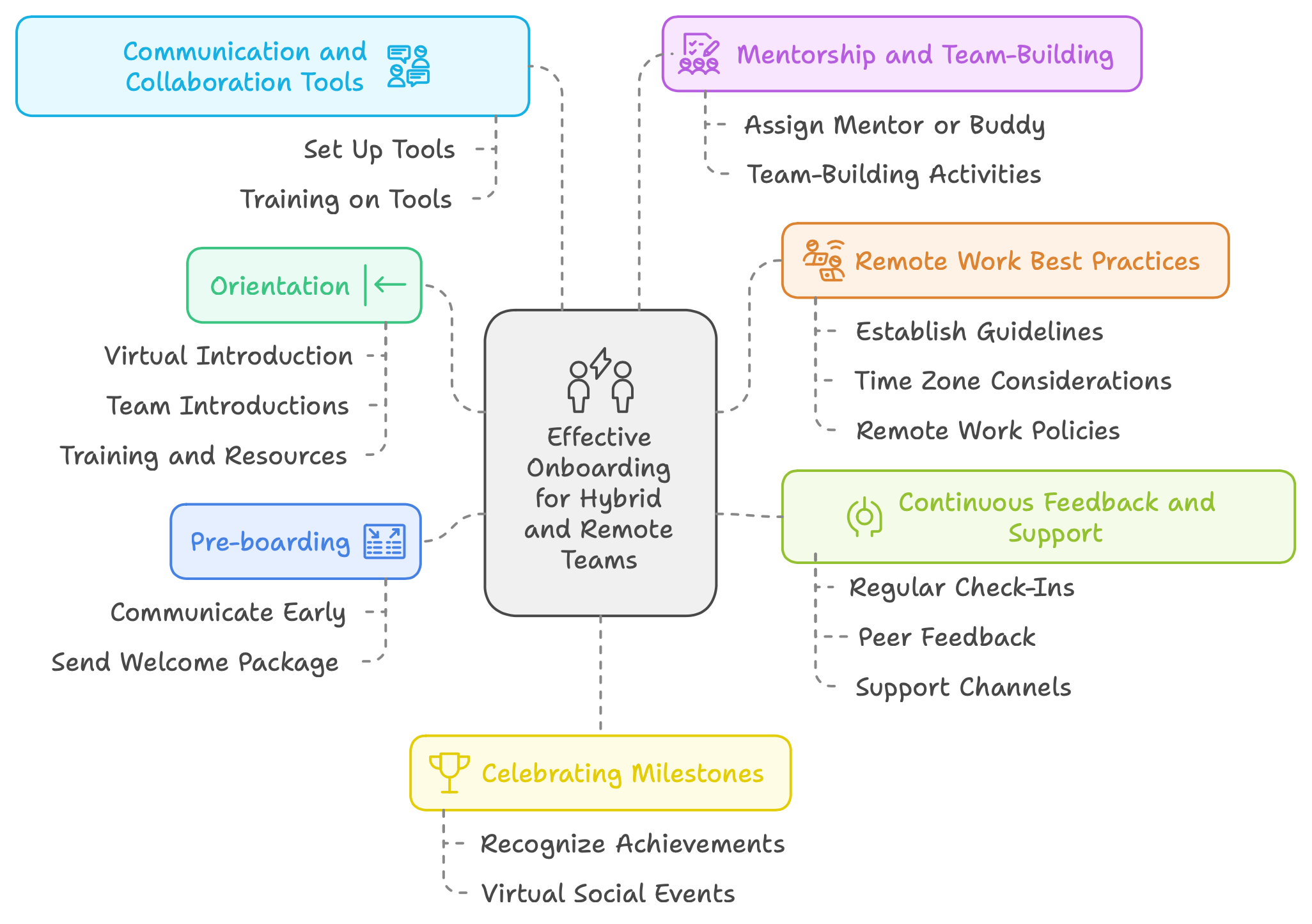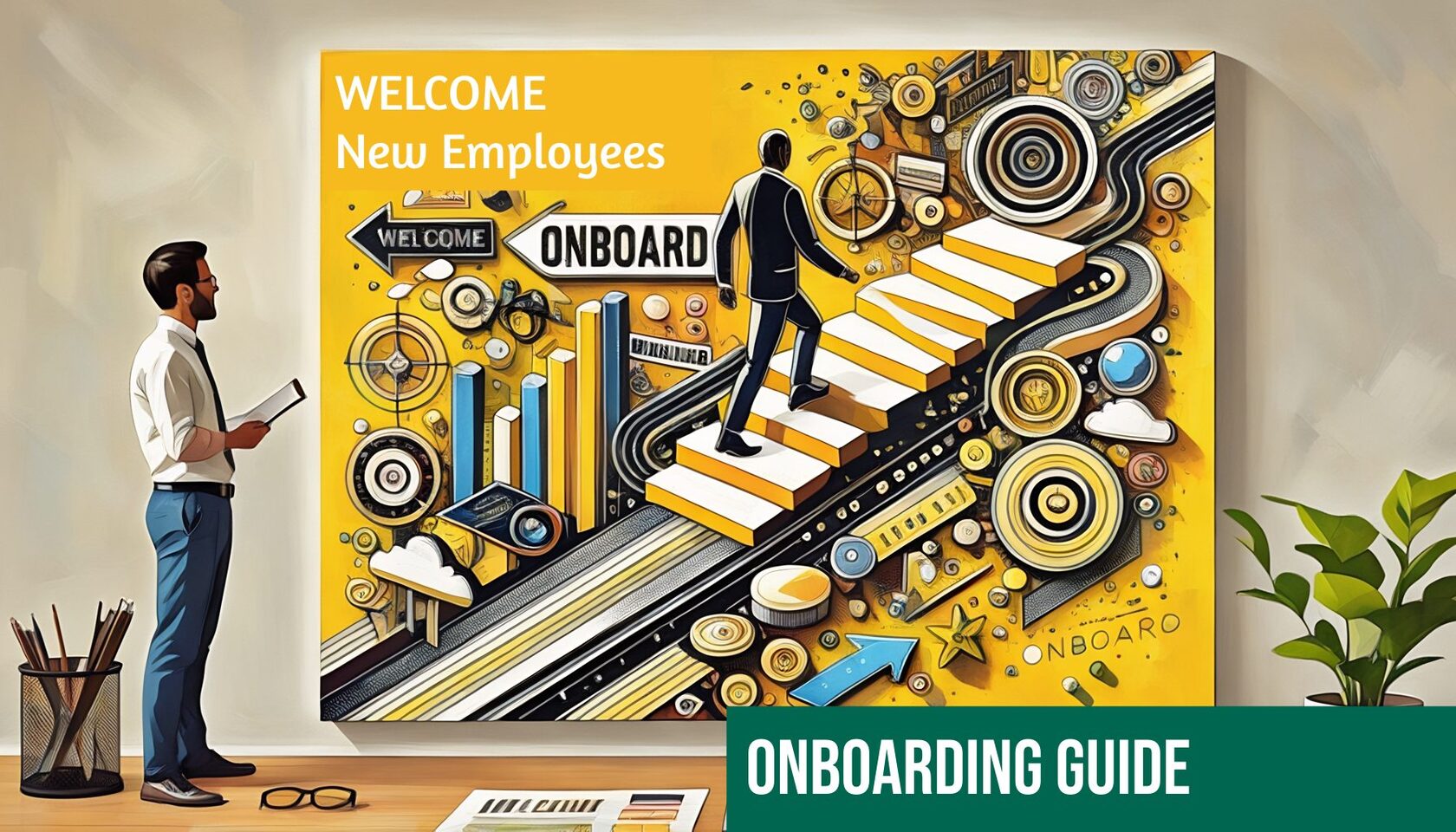The Key Elements of the Onboarding Process for Hybrid and Remote Teams
When COVID19 starts as almost all the companies my company had to move to remote working and we used to be more hybrid afterwards rather than on-site. We really faced with several challenges as many of us that time and had to develop new approaches in onboarding process for new comers.
Onboarding hybrid and remote teams effectively is crucial for ensuring a smooth transition and fostering a sense of belonging and productivity among team members. Based on the learning I have developed a comprehensive guide to help you onboard hybrid and remote teams successfully:
Onboarding hybrid and remote teams effectively is crucial for ensuring a smooth transition and fostering a sense of belonging and productivity among team members. Based on the learning I have developed a comprehensive guide to help you onboard hybrid and remote teams successfully:

Pre-boarding:
- Communicate early: Before new team members join, inform them about the onboarding process, their role, and responsibilities. Provide them with essential information, such as access to necessary tools, software, and documentation.
- Send welcome package: Create a virtual welcome package that includes company culture, values, mission, and any relevant materials to help new team members understand the organization better.
Orientation:
- Virtual introduction: Organize a virtual orientation session where new team members can meet their colleagues, managers, and key stakeholders. Provide an overview of the organization, team structure, and goals.
- Team introductions: Encourage existing team members to reach out and welcome new members individually, either through email, video calls, or virtual coffee chats.
- Training and resources: Provide comprehensive training materials, recorded video sessions, and documentation to help new team members understand their roles, tasks, and processes. Offer access to online learning platforms or internal knowledge bases.
Communication and Collaboration Tools:
- Set up tools: Ensure new team members have the necessary accounts and access to communication and collaboration tools like project management platforms, video conferencing software, instant messaging tools, and document sharing platforms.
- Training on tools: Conduct training sessions or provide resources to help new team members become proficient in using the tools effectively for remote collaboration.
Remote Work Best Practices:
- Establish guidelines: Clearly communicate expectations for remote work, including availability, response time, meeting etiquette, and communication norms.
- Time zone considerations: If team members are spread across different time zones, establish guidelines for scheduling meetings, ensuring everyone has equitable participation.
- Remote work policies: Provide new team members with information about remote work policies, including security measures, data protection, and any relevant legal considerations.
Mentorship, Buddy, and Shadow System:
- Assign a mentor or buddy: Pair new team members with experienced colleagues who can provide guidance, answer questions, and offer support throughout the onboarding process. Encourage regular check-ins and virtual meetups.
- Team-building activities: Plan virtual team-building activities to foster relationships and encourage collaboration. This could include virtual games, team challenges, or social events.
Continuous Feedback and Support:
- Regular check-ins: Schedule regular one-on-one meetings between managers and new team members to provide feedback, address concerns, and gauge progress.
- Peer feedback: Encourage peer-to-peer feedback to facilitate knowledge sharing and promote a culture of continuous learning.
- Support channels: Establish channels, such as Slack channels or dedicated email addresses, where new team members can seek assistance or clarify doubts.
Celebrate Milestones:
- Recognize achievements: Acknowledge and celebrate milestones and achievements of new team members, whether it's completing training, delivering successful projects, or reaching a certain tenure within the organization.
- Virtual social events: Organize virtual social events like happy hours, team lunches, or online games to promote a sense of camaraderie and inclusiveness.
Remember, effective onboarding is an ongoing process. Continuously seek feedback from new team members and make adjustments to improve the onboarding experience for future hires.
I also recommend you to read related articles:
Why Startups Need Fractional HR: Immediate Expertise at a Fraction of the Cost
Transformative Potential of Hybrid Organizational Structures
The Power of Hybrid Work: What are the Pros and Cons?
How remote and hybrid working changed the role of teams and challenge leadership
I also recommend you to read related articles:
Why Startups Need Fractional HR: Immediate Expertise at a Fraction of the Cost
Transformative Potential of Hybrid Organizational Structures
The Power of Hybrid Work: What are the Pros and Cons?
How remote and hybrid working changed the role of teams and challenge leadership
UnitiQ: Enhancing Onboarding for Hybrid and Remote Teams
UnitiQ’s HR services are designed to help businesses navigate the complexities of onboarding hybrid and remote teams. With flexible, on-demand solutions, UnitiQ supports companies in creating seamless onboarding experiences that foster connection and productivity from day one.
Whether it's setting up virtual introductions, ensuring access to the right tools, or establishing mentorship systems, UnitiQ's tailored HR strategies ensure that new hires feel welcomed, engaged, and well-prepared for their roles.
By focusing on continuous feedback and support, UnitiQ helps organizations build cohesive, high-performing remote and hybrid teams.
Contact me, Olga Fedoseeva, Fonder at UnitiQ, directly:
My Telegram
My LinkedIn
Whether it's setting up virtual introductions, ensuring access to the right tools, or establishing mentorship systems, UnitiQ's tailored HR strategies ensure that new hires feel welcomed, engaged, and well-prepared for their roles.
By focusing on continuous feedback and support, UnitiQ helps organizations build cohesive, high-performing remote and hybrid teams.
Contact me, Olga Fedoseeva, Fonder at UnitiQ, directly:
My Telegram
My LinkedIn








